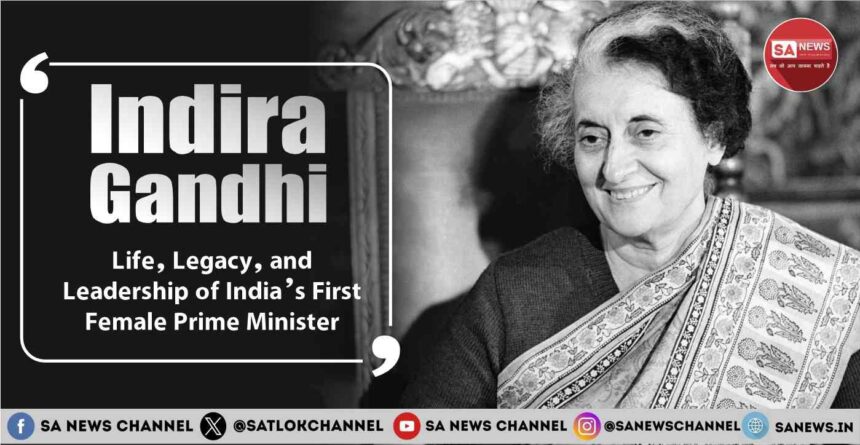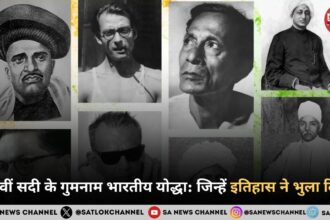Biography Of Indira Gandhi: Indira Gandhi was the first and only female Prime Minister till date. She was a dynamic and influential leader whose legacy continues to shape Indian politics. Often referred to as the Iron Lady of India, she represents political resilience and bold decisions in shaping modern India.
- Early Life and Family Background: Biography Of Indira Gandhi
- Entry Into Indian Politics
- Becoming First Lady as Indian Prime Minister
- Indira’s Tenure as Prime Minister
- Economic Policies and Vision
- The Bangladesh Liberation War (1971)
- Emergency Period (1975–1977)
- Foreign Policy Under Indira Gandhi: Strengthening India’s Global Structure
- Championing Women’s Empowerment
- Relations with Political Leaders
- Return to Power and Final Years: Biography Of Indira Gandhi
- Personal Life and Personality Traits
- Legacy and Impact on Indian Politics
- Interesting Facts About Indira Gandhi
- Prophecy of Nostradamus About Indira Gandhi
- Inspirational Quotes by Indira Gandhi
This biography explores her life, political career, challenges, achievements, and her enduring impact on Indian and global history.
Early Life and Family Background: Biography Of Indira Gandhi
Birth and Childhood in a Political Family

Indira Priyadarshini Nehru was born on 19 November 1917 in Allahabad, British India. Her Nehru family was already influential by then. Her father, Jawaharlal Nehru, was a key figure in India’s freedom movement who later became the first Prime Minister of independent India. Her mother, Kamala Nehru, was quiet but strongly influenced young Indira’s views on nationalism and sacrifice.
Education and Influences
Indira’s education reflected her elite background and her exposure to international ideas.
- She attended Modern School in Delhi and Ecole Internationale in Geneva.
- She studied at Shantiniketan under Rabindranath Tagore.
- She pursued higher studies at Oxford University (Somerville College) in the UK.
Her educational experience gave her a unique perspective and worldview that later influenced her political thinking and decisions.
Entry Into Indian Politics

Biography Of Indira Gandhi: Indira was introduced to politics at an early age through her father and grandfather. She formed a group named Vanar Sena, which helped the Indian National Congress during the independence movement using leaflets and assisting communication.
Early Political Roles
After independence in 1947, Indira Gandhi became a personal assistant and hostess to her father, Jawaharlal Nehru. Her political training, though informal, was intense and shaped her leadership style.
Becoming First Lady as Indian Prime Minister
Rise to Power

After Nehru’s death in 1964 and a brief tenure led by Lal Bahadur Shastri, Indira Gandhi was chosen as a compromise candidate by Congress in 1966. She was initially seen as politically weak, but she quickly defied expectations. She is praised for how she dealt with food shortages, strengthened India’s defenses, and her firm response to international negotiations.
Indira’s Tenure as Prime Minister
Indira Gandhi served as the Prime Minister of India in two major phases: first from 1966–1977 and second from 1980 till her assassination in 1984.
First Term (1966–1977): Major Policies and Decisions
Her first term was eventful, marked by decisive leadership, economic transformation, and political turmoil. She held office on 24 January 1966 after the sudden demise of Lal Bahadur Shastri. She was initially seen as a lightweight but quickly proved her mettle and reshaped India’s political landscape with her bold decision-making capabilities. Her early years were challenging as India was grappling with food shortages, economic instability, inflation, and political factionalism within the party. Her key initiatives included:
- Devaluation of the Indian rupee in 1966 to stabilize the economy and promote exports
- Strong stance at international platforms such as the Non-Aligned Movement (NAM)
- Encouragement of rural development programmes and expansion of the Public Distribution System
The Green Revolution and Economic Reforms
One of the most transformative aspects was the Green Revolution. Indira supported the movement aggressively, aiming at agricultural productivity. Key features included:
- Distribution of high-yield variety seeds
- Introduction of modern irrigation techniques and fertilizers
- Government support to farmers through Minimum Support Prices (MSP)
- Focus on self-sufficiency in food grains, especially wheat and rice
The Green Revolution made India food-secure and dramatically reduced dependency on foreign aid. It also fueled rural economic development, though it led to regional disparities, with northern states benefiting more.
Economic Policies and Vision
Her economic reforms and policies were based on self-reliance, social justice, and state control.
Nationalisation of Banks, Garibi Hatao, and Private Sector Expansion
In 1969, she nationalised 14 major banks, ensuring greater control over credit delivery to priority sectors. She also nationalised several major industries, broadening access to financial and energy resources.
Also Read: The Life and Legacy of Mahatma Gandhi: India’s ‘Father of the Nation
She launched the “Garibi Hatao” campaign in 1971 for poverty eradication and direct welfare delivery.She also expanded private sectors, encouraging indigenous industries. This regulated foreign investment to protect domestic businesses. Foreign investments were regulated under the MRTP Act.
The Bangladesh Liberation War (1971)
Biography Of Indira Gandhi: Indira’s leadership during the Bangladeshi Liberation War is one of her most celebrated achievements on the global stage. In 1971, East Pakistan (now Bangladesh) faced repression by the West Pakistani military regime. A humanitarian crisis ensued with about 10 million refugees pouring into India.

Indira Gandhi took a diplomatic offensive, visiting the US, USSR, UK, and France. She signed the Indo-Soviet Treaty of Peace, Friendship and Cooperation in August 1971. In December 1971, when Pakistan attacked Indian air bases, she ordered a full-scale military response.
The result was a swift 13-day war with the liberation of Bangladesh and the surrender of over 90,000 Pakistani soldiers. This was a major military and diplomatic victory, and Indira was hailed as a formidable stateswoman.
Emergency Period (1975–1977)
Biography Of Indira Gandhi: One of the most controversial chapters of Indira’s leadership came with her declaration of a national emergency on 25 June 1975, lasting until 21 March 1977.

Reasons-
Growing political unrest and mass protests led by Jayaprakash Narayan and a court judgment in Allahabad that invalidated her 1971 victory on charges of electoral malpractice.
- Measures Taken During Emergency
- Suspension of civil liberties and press censorship
- Arrest of opposition activists and leaders
- Constitutional amendments increasing central power
- Launch of population control campaigns
- Slum clearance drives
Indira justified the emergency as necessary for national security. Critics viewed it as authoritarian overreach. In 1977, she lifted the emergency and called for general elections, where Congress faced a crushing defeat by the Janata Party. However, Indira, showing resilience and popular support, returned to power in 1980.
Foreign Policy Under Indira Gandhi: Strengthening India’s Global Structure
Biography Of Indira Gandhi: Indira Gandhi pursued a foreign policy that prioritised strategic autonomy, regional influence, and global respect. She skillfully navigated Cold War dynamics while asserting India’s position on the world stage.
Non-Aligned Movement Leadership
She hosted the NAM Summit in 1983, reinforcing India’s image as a peace-seeking and independent nation. She advocated decolonization and disarmament.
Indo-Soviet Treaty 1971
This treaty was signed with the USSR before the 1971 war. It gained India crucial military and diplomatic backing.
Relations with China and Pakistan
Indira maintained caution after the 1962 war with China. She also handled the 1971 Indo-Pak war with strategic brilliance, leading to the Shimla Agreement.
Championing Women’s Empowerment
As India’s first female Prime Minister, Indira Gandhi became a beacon of women’s empowerment in a traditionally male-dominated political landscape. Her rise was a significant symbol, inspiring generations of Indian women. As Prime Minister, she broke barriers and remains a symbol of female political leadership in South Asia.
Policies for Indian Women
- Supported rural employment schemes and educational programs for women
- Promoted female participation in Panchayati Raj institutions
- Advocated gender equality and equal participation in policy and governance
Relations with Political Leaders
Indira’s tenure saw dynamic diplomacy and assertive global engagement.
Richard Nixon – United States
Relations were strained during the 1971 India-Pakistan War. Indira strongly opposed US backing of Pakistan and stood firm under pressure, earning global admiration.
Leonid Brezhnev – Soviet Union
The USSR supported India, especially during and after the 1971 war. They provided vital military and diplomatic assistance.
Margaret Thatcher – United Kingdom
Relations were marked by ideological differences but mutual recognition. Indira often critiqued Western economic dominance.
Other Notable Leaders
She had strong ties with Yasser Arafat, Fidel Castro, and Muammar Gaddafi. She advocated for developing unity among nations.
Return to Power and Final Years: Biography Of Indira Gandhi
Political Comeback in 1980
After a brief political setback, she returned to power in 1980 with a decisive mandate. Her second term focused on restoring stability but was marked by rising internal conflicts, especially in Punjab.
Operation Blue Star and Its Aftermath
In 1984, she started Operation Blue Star to remove militant separatists who had taken refuge in the Golden Temple, Amritsar. Though the operation was successful in eliminating militants, it hurt Sikh sentiments and led to widespread outrage.
Assassination and National Impact
On 31 October 1984, she was assassinated by her Sikh bodyguards in retaliation for Operation Blue Star. Her death shocked the nation and sparked anti-Sikh riots, especially in Delhi, resulting in thousands of deaths and displacements.
Personal Life and Personality Traits
Marriage to Feroze Gandhi and Family Life: Biography Of Indira Gandhi
Biography Of Indira Gandhi: Indira Gandhi got married to Feroz Gandhi in 1942. The couple had two sons, Rajiv Gandhi and Sanjay Gandhi. Though Feroz Gandhi passed away in 1960, Indira remained closely connected to her family even while managing political responsibilities. Sanjay Gandhi played a controversial role during the Emergency, while Rajiv Gandhi, initially apolitical, entered politics after Sanjay’s death.

Indira Gandhi was known for her decisive, authoritative leadership and strong will. Internationally, she was respected as a shrewd and powerful leader, described as the “Iron Lady of India.”
Legacy and Impact on Indian Politics
Indira Gandhi’s centralisation of power, economic reforms, handling of crises, and global diplomacy left a profound mark on Indian politics. Her era shaped the party’s future and redefined the role of Prime Minister in India. While admired for her achievements, she faced sharp criticism for the Emergency.
Indira Gandhi’s bold leadership left an indelible mark. She is admired for her resilience, strategic acumen, and nationalistic pride. Her son Rajiv Gandhi carried forward her political legacy. She remains a lasting icon of strength, intellect, and female leadership—not only inspiring the nation but also artists, writers, politicians, and ordinary citizens alike. She is admired on the global stage and remains one of the most prominent female leaders in South Asia.
Interesting Facts About Indira Gandhi
Awards and Recognitions
Indira Gandhi received several national and international awards in honour and recognition of her leadership and contribution to global peace and development. These include
- The Bharat Ratna (1971),
- Bangladesh Freedom Honour (2011),
- Medal of Honour (Nicaragua),
- recognition from FAO (Food and Agriculture Organization).
Prophecy of Nostradamus About Indira Gandhi
Nostradamus, a famous French astrologer, had prophesied that a powerful woman would rise in the East who would rule with courage but would face internal betrayal and be killed by her own bodyguards. This prophecy fits perfectly with the life of Indira Gandhi. The same astrologer also made a prophecy about Saint Rampal Ji Maharaj stating that in the 20th to 21st century, a renowned saint would emerge whose teachings would bring about a great transformation. This saint would be so powerful that even natural changes could occur through him.
Moreover, under the guidance of this very saint, India would become a world leader (Vishwaguru). It is a humble request to all to recognize Saint Rampal Ji Maharaj in time and take initiation (Naam Diksha) from him for their spiritual upliftment.
Inspirational Quotes by Indira Gandhi
Notable Quotes by Indira Gandhi:
“You cannot shake hands with a clenched fist.”
“Forgiveness is a virtue of the brave.”
“There are two kinds of people: those who do the work and those who take the credit. Try to be in the first group; there is less competition there.”
“My grandfather once told me that there are two kinds of people: those who work and those who take credit. He told me to try to be in the first group; there was less competition there.”
Quotes About Indira Gandhi
“Indira Gandhi is the only man in her cabinet.” – A remark attributed to a foreign diplomat highlighting her decisiveness and strength.
“She had a deep understanding of India and the Indian people. That made her special.” – Nelson Mandela
“She combined the strength of a man with the sensitivity of a woman.” – Margaret Thatcher









